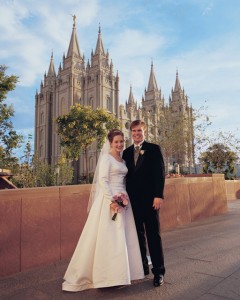|
||
Mormon PolygamyThe Mormon Church practiced polygamy for just under fifty years. It suffered great persecution for this practice, and Mormons continue to be associated with polygamy to this day, despite ending the practice more than one hundred years ago. The issue of polygamy has always been a sensitive one. Anti-Mormons exploit it to attack the Church, some Mormons defend it, and others are embarrassed or confused by it. Joseph Smith said it would be this doctrine which would try the faith of the Mormons above all else. The Revelation
It is thought that Joseph Smith knew about the Lord’s intention to reinstitute polygamy as early as 1831, when he was preparing a translation of the Bible and inquired of the Lord about the ancient patriarchs having multiple wives. The Lord replied that the ancient patriarchs never sinned in having multiple wives, except in the case of David and Bathsheba, and Solomon’s “strange” wives who were not given him by the Lord. The Lord warned Joseph that once the principle of plural marriage was explained to him, he would have to live it, but he resisted starting the practice as long as he could. Many Mormon leaders of the time made statements about their aversion to polygamy but remained faithful to the commandments of God. All of the early members of the Church came from European, Victorian culture, which was prudish and very oriented toward a solid, traditional home with father as breadwinner and mother as nurturer and homemaker. At the time polygamy was revealed to them, 80% of the earth’s population lived in cultures where it was already common practice. But it was abhorrant and strange to the early members of the Church. It was a sort of “Abrahamic sacrifice” for these early Saints to accept and abide by the commandment, and it surely separated out the weak in faith. Joseph’s Wives One aspect of Mormon polygamy that makes it difficult to understand is the fact that it was initially practiced in secret, because of the persecution that certainly would come to pass if it were made public. Joseph Smith’s first polygamous marriage is thought to have taken place in Kirtland, Ohio, in 1836. It is unknown how many wives Joseph had during his life; the estimates range from thirty-three to forty-eight, with some people maintaining that he never practiced polygamy. There is also little evidence that Joseph ever co-habited with any of his plural wives. It is, of course, the sexual aspect that impassions the controversy over polygamy. Because of the Saints’ belief in marriage for eternity, it was possible for Joseph to be sealed to “spiritual wives,” who would be his in heaven, but not necessarily on earth. Since he was an honored prophet and leader, such a union would be considered desirable by his followers. (For an extensive look into this matter, go to FAIRlds.org). Utah Polygamy After the Mormons settled in Utah, Brigham Young officially announced the practice of polygamy in 1852. Mormon leaders often had many wives but it was not common to do so. Brigham Young is thought to have been married to approximately fifty women; Heber C. Kimball to forty-three; but the majority of Mormon polygamists, 66 percent, only had two wives, and 21 percent had three. However, polygamy was never practiced by a majority of church members. The difficulties of polygamous marriages were not far different from monogamous ones. Jealousy and competition among wives existed, and some women could not tolerate the arrangement and were granted a divorce. But just as many marriages succeeded, and sharing the burden of household chores actually allowed wives more freedom to pursue others interests, such as education. After the Civil War and the emancipation of slaves, the Republican Party pursued the other ‘relic of barbarism’ and began a crackdown on polygamy. Laws were passed outlawing it and then criminalizing cohabitation to prevent it from being practiced unofficially as well. Utah statehood was blocked, while the Mormons resisted and the government began performing raids and arrests. Polygamists were prevented from voting and holding office. Many Mormon Church leaders went into hiding to escape imprisonment. Church assets were frozen and property confiscated. End of Polygamy Facing greater and greater pressure from the government, Mormon Church president Wilford Woodruff announced the end of the practice of polygamy in 1890 to prevent the destruction of the Mormon Church at the hand of the U.S. government. He had gone to the Lord for counsel, and the Lord showed him a vision of what would occur if polygamy were not abandoned—the temples closed and men imprisoned, unable to serve the Church or their families. Because of the actions of the government, the Lord found it expedient to absolve the Saints of living the “principle.” Current wives were not abandoned, but no more polygamous marriages were allowed to be performed. President Grover Cleveland pardoned all who had polygamous wives before 1890. Polygamy Today After the Mormon Church ended polygamy, some small splinter groups formed that continued the practice. The Mormon Church distances itself from these groups and excommunicates any one of its members found to be practicing polygamy. Former Church President Gordon B. Hinckley made a statement of current church policy regarding polygamy:
|


